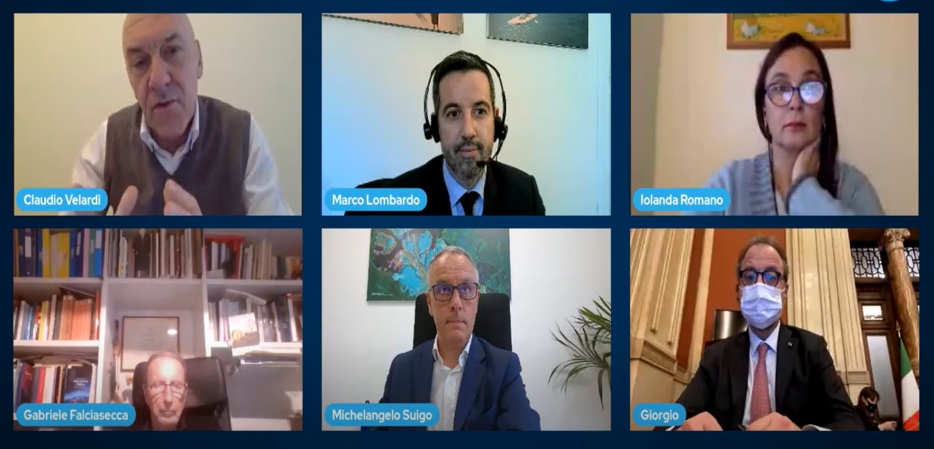5G and electromagnetism: Italy can’t afford to sabotage itself

For the second installment of #TalkFor5G, a webinar series organized by INWIT, participants spoke about the need to overcome false beliefs, irrational fears and bureaucratic hitches to speed up the rollout of new 5G networks and communicate the advantages of 5G.
For the second installment of #TalkFor5G, a webinar series organized by INWIT, participants spoke about the need to overcome false beliefs, irrational fears and bureaucratic hitches to speed up the rollout of new 5G networks and communicate the advantages of 5G
How can we involve local entities in the adoption of 5G? This is the main topic of the second webinar in the TalkFor5G series, organized by INWIT in collaboration with the Ottimisti&Razionali Foundation, titled “5G and electromagnetism: involving communities and combating fake news.”
Following the success of the first #TalkFor5G webinar – titled “The value of 5G: potential and services. 5G among fears, fake news and disinformation: could it be we need more information?” – the debate in the second live event shifted to how to combat disinformation and incentivize digitalization with the direct involvement of communities.
Suigo: “Italy can no longer afford not to be set up with infrastructure”
“Italy cannot afford to self-sabotage regarding 5G, especially in the current context of an increasingly digitalized global economic system and the pandemic crisis, which has emphasized the extreme urgency of being set up with advanced and resilient infrastructure,” stressed Michelangelo Suigo, External Relations & Communication Director at INWIT. “5G is the technology of the recovery” and so we need to come to citizens and communicate the advantages of this new standard. “Reduction of conflict, correct information and the centrality of science,” according to Suigo, are “where we should start from.”
Bruno Bossio (PD): “Difficult to get the message across”
“We need a positive narrative about 5G,” explained Enza Bruno Bossio, a PD MP in the Chamber’s IX Transport and Telecommunication Commission, “but this isn’t a complicated task. Even though all scientific institutes have confirmed there is no electromagnetism problem, it is still difficult to get the message across,” said Bruno Bossio. “Today, it’s important to push its spread, where Italy has a competitive advantage over other European countries, which we mustn’t lose.”
Mulè (FI): “without 5G, we won’t overcome the digital divide”
“5G isn’t bad for our health, but it’s good for our future: without 5G, we won’t overcome the digital divide,” explained the FI MP Giorgio Mulè. “With the Recovery fund, we must initiate a basic educational course for the population, which would also lead to the development of professional skills in fields connected to 5G. In Italy, we have a digital literacy problem, and we have to work on conditioning.”
Bussone (Uncem): “Synergy between Parliament and local entities to overcome bureaucratic difficulties”
According to the president of Uncem, Marco Bussone, “for 5G and overcoming the digital divide – which is a serious problem that cannot exist in a country looking toward the future – we need cultural, institutional and political mobilization to show us no one will be left behind. A cultural and synergic process between Parliament, with MPs expressing themselves in favor of a certain path, and local entities, for a cohesive and united country looking toward the future,” underlining the need for regulatory simplification to allow us to overcome bureaucratic difficulties.
The right way to overcome resistance and fear is through dialogue. Marco Lombardo, council member for the Municipality of Bologna, says that, in Italy, “we’ve discussed 5G a lot but not in the right way – on one hand, treating is as a savior technology and, on the other, demonizing it.” In this way, “the risk is that citizens seek out the truth on the internet,” with fake news consequences that we’re all aware of. “This is why we’ve brought the many monologues out there about 5G to the dialogue table, to bring the debate to science and rationality, highlighting the many entrepreneurial and employment opportunities that arise from 5G.”
Falciasecca (Alma Mater Studiorum): “Irrational fears about 5G”
The online deceptions about mobile networks are “irrational” fears and unsupported by any scientific basis, linked to the fear of “electromagnetism,” explained Gabriele Falciasecca, Prof. Emerito of the Alma Mater Studiorum in Bologna. “Already some time ago, there was a certain irrational fear about GSM antennae,” recalled Falciasecca. “This is why, in the current situation for 5G, it’s important to show public opinion and local administrators what the advantages of 5G are in the most effective way possible. There is still a lot of work to do, given that, according to recent studies, 80% of SMEs are unaware of the benefits of 5G. We rely on data from ICNIRP, ISS and OMS and we also need to take action in schools.”
Romano (Avventura Urbana): “Citizen concern is an opportunity to overcome fears”
“We need to take citizens’ concerns seriously. They aren’t threats, but rather opportunities to overcome fears,” said Iolanda Romano, a public mediator and founder of Avventura Urbana, who says the heart of the problem is citizens’ lack of basic trust in institutions. “The goal is to find data that can be shared by everyone. Public debate is fine, but it must be limited in time and must involve technicians from Asl and Arpa”.
The relevant discussions of this second installment can be read again in a Twitter live feed of the event.